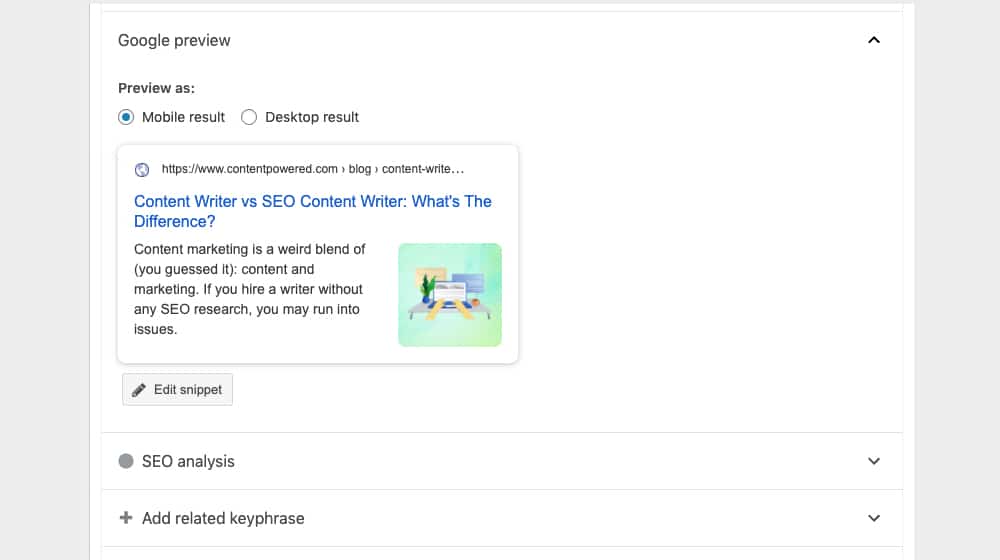Content Writer vs SEO Content Writer: What's The Difference?

There are thousands upon thousands of people out there willing to write content for you and your website. Some of them want a byline, some of them are just happy to be paid, and some of them just want a link to their own content.
They go by many names. SEO writer, content writer, SEO content writer, copywriter, freelance blogger; all of these terms are similar, but they have their own specific meanings.
The issue you might run into most frequently is on the difference between a content writer and an SEO content writer, or an SEO writer for short. So what is the actual difference between them?
 30 Second Summary
30 Second Summary
You can find many different types of writers to create content for your website. When picking between a content writer and an SEO writer, you need to know that SEO writers have special training in making content that ranks well on Google. You'll need to decide if you want someone who can write good content (content writer) or someone who can write content that follows all of Google's rules (SEO writer). If you want your content to show up in search results, you should pick an SEO writer who knows how to use keywords naturally and follow SEO best practices.
Specialization
The key difference between a general content writer and an SEO writer is specialization. To draw an analogy, you might have a woodworker who is capable of making just about any kind of furniture out of wood, or you might have a cabinetmaker. The cabinetmaker might not be able to make you a table or a chair, but the cabinets they make for you will be leagues above the quality, presentation, and functionality of the cabinets made by the generalist woodworker.

Every job, every role, has its specialists. These people spend hours upon hours training, learning, and gaining experience in their subsection of their role.
With content writing, specialists tend to focus on subjects, or on kinds of content. You might have a financial writer, or a business writer, or a medical writer. These people know their subjects, probably better than a generalist writer could.
An SEO writer is a little different. Rather than focusing on the content of the writing, they learn the techniques necessary to format and present that writing.
SEO writing is a specialized kind of writing, and it takes a particular kind of talent to follow all of the rules while still producing content that, well, doesn't suck.
SEO Rules and Writing
To give you an idea of how complicated SEO writing can be, here are a handful of the rules an SEO writer has to follow with their content.
The content has to be unique. That's not too difficult, of course; all but the worst content writers will produce more or less unique content for you, even if the specific value of the piece isn't all that unique. It won't trigger duplicate content checks, in any case.

The content has to have an easy to read structure. Much has been said about writing at certain grade levels, but there's more to it than that for SEO. We're not talking about the blogging equivalent of YA writing; we're talking about things like bold and italics formatting, short paragraphs, bulleted lists, and subheadings.
Knowing when and where to divide up content to keep it interesting, to give information to the reader, and to allow those who skim to still extract value is a crucial skill for an SEO writer. A general content writer might be able to adapt to the format eventually, but it's very much a learned skill.
The content needs to be concise. Have you ever noticed just how dense the average blog post is? In many cases, you could condense it down to an outline and it would still be 75% of the original. Rarely is there room for fluff, or even for expanded reasoning, and it can be a tricky thing to insert your own writing voice in that kind of writing. A general content writer is free to add as much fluff as they want because the only authority they're beholden to is whoever publishes and edits their content.
The content needs to utilize keywords. Keywords are the backbone of how Google analyzes content and indexes it so it can be visible in search results. Without appropriate use of keywords, your content is less likely to be found, and that means the SEO writer isn't doing their job. Every post you write should ideally have some search queries in mind. Ask yourself, what would someone have to type into Google to find my post, and what would they be learning?

Keywords are very tricky. You have to know what your keywords are when you're writing (before you start writing) and when you're editing. You need to make sure not to under-use them, because then the overall topic might not come across. You need to make sure not to over-use them or else you can earn a search penalty for keyword stuffing.
You also have to learn how to naturally use keywords. Remember a decade ago, when you would have mid-sentence keywords like "pest control in northeastern Austin, Texas" used seven times in a 1,000-word post? It always read completely unnaturally. You could spot the keyword from the article a mile away.
What are the keywords for this article, the one you're reading now? If you guessed something like "SEO content writer", you'd be correct, but you'll notice how I'm not shoehorning it into places it doesn't belong. I'm using variations. I'm using it naturally. That's a skill I've developed over a number of years, and it's a very important skill for SEO writing.
A general content writer, even if they're typically writing blog posts, usually doesn't have to worry about most of this. Sure, if they write for a content mill that has keyword tracking and minimum usage requirements, that's one thing. If they're writing for businesses that don't know any better, or for personal blogs, or for websites that don't care about SEO, that's another.
Continuing Education
Another thing that separates a content writer from an SEO writer is continuing education.
A teacher needs to keep learning, so they know how to teach most effectively. A doctor needs to stay up to date on modern treatment options and new research. An IT professional needs to stay on top of software updates and new threats. An SEO writer needs to keep up with Google.
Google is always changing their algorithm. Sometimes these changes are minor; something that requires no change from the writer or site owner, something that affects just a small handful of fringe foreign queries, or the like. Sometimes Google's changes affect a lot of sites, but not in a way a content writer needs to worry about, like their mobile-first updates.

Other times, Google makes changes like its Panda update nine years ago, which upended the entire SEO writing industry and forced everyone to adapt or fail. If you're relatively new to SEO, I recommend reading up on how Panda changed everything. It's really quite interesting, and it just goes to show that even years-established best practices can be upended at a moment's notice.
Is Google likely to make another earth-shaking algorithmic update like that any time soon? Probably not. Maybe if they develop a new technology that makes parsing real value out of content much easier, they could. If a massive cultural shift in attitude towards online content happens, that could also do it. Otherwise, there's no reason to do so.
That said, Google is constantly making changes, large and small. Just take a look at the history of updates. Any one of these entries could be something that the SEO writer needs to understand if they want to write effectively.
After all, the point of SEO writing is to make sure your content appears on Google, which means following all of Google's rules and recommendations, as well as experimenting to find what works above and beyond those minimums. If Google makes a change and the writer doesn't acknowledge it, that can make their content perform worse, which makes them less effective at their job.
Versus Other Kinds of Writing
An SEO writer is focused specifically on writing with search engine optimization in mind. What about other kinds of writers? How do they differ from SEO writing?

Versus technical writing: Technical writing is a lot closer to SEO writing than a lot of other forms of writing. It usually involves following specific sets of rules, but the resulting product tends to be a lot more formal. It's not so much a blog post as it is documentation, stuff that has no room for expression (or opinion).
Versus copywriting: Copywriting is typically a more formal kind of writing, and the standard definition puts it somewhere between content writing and SEO writing. It's more focused on things like website copy, landing pages, and sales pitches, rather than blog posts. As such it, again, has less room for opinions and self-expression, though it's more open to those when using them has a defined goal in reaching an audience and boosting sales.
Versus academic writing: Academic writing is an entirely different beast, where self-expression and opinion are the order of the day. It's similar to SEO writing in that you're following rules expressed by an external authority, or in this case, a style guide like AP or MLA. On the other hand, it's more focused on things like backing up opinions with citations and facts, and specifically formatting those citations. While the core skills of "following the rules" are the same as SEO writing, the actual practice and results are very different.
Versus knowledge Base writing: Knowledge bases, whether they're customer-facing or internal, are another specific kind of writing. You need to write in clear and concise ways, but rather than having to follow a style guide or Google's rules, you instead have to do everything in your power to make sure you're accurately conveying your information. Knowledge bases usually require detailed information and step by step guides, and that can be difficult to write in a way that doesn't assume knowledge or a certain user state.
Versus (e)book writing: Writing books or ebooks is another wildly different format, and is more like normal content writing. A book isn't constrained by length, it doesn't have to worry about keywords, and it can be laden with as many opinions and as much voice and style as you want. It's very free-form and very open to whatever the writer wants to do, making it more or less the opposite of SEO writing.
Versus Other Blogging Roles
The SEO writer has one task: to take a topic or a set of keywords and produce a piece of high-quality blog writing based on them. A writer alone might not want to do anything more than that, but there are other roles in blogging that may.
Versus a content strategist: A content strategist is not necessarily a content writer, though they may do writing as well. They have to keep SEO in mind, so they can do the job, though they may not have the technical chops to do the writing in a compelling way. A content strategist is, instead, the person who guides the overall topics for the blog, who ties it into the company's overall marketing strategy, and who does things like keyword research in the first place. They're the person telling the writer what to write.
Versus a blog manager: A blog manager is a more overarching role. Small businesses might have a blog manager who handles everything, including writing, keyword research, content strategy, technical SEO, social media, and promotion. Larger businesses might have a blog manager who controls all of that through delegating and working with a team to cover each individual part; an SEO guy, a writer, a social media pro, and so on.

There is, of course, some overlap between all of these: the writer positions and the blogging roles. An SEO writer might have access and experience with keyword research tools, and they might be able to help guide the blog's direction themselves. A blog manager may have experience in writing and can handle putting together the content themselves. A writer might know enough about technical SEO to handle blog management as needed, from a ground-up perspective.
You can think of SEO as a skillset a writer can know or learn. Hiring a writer without that skillset means taking on more of the guidance and responsibility yourself, while hiring someone who knows your industry means you can rest easy knowing they have it handled. Finding someone who fits the exact role and skillset you need is one of the challenges with hiring any role, writers included.
Do You Need An SEO Content Writer?
So here's the question: do you need an SEO writer, or can you get by with a content writer?
The answer depends on how much work you want to be doing, what other people you have on your team, and how concerned you are with SEO.
Hiring a general content writer can work just fine. You can edit their content to insert SEO best practices, and you can guide them as they work for you to teach them the basics to make your job easier. They may be less expensive than an SEO-trained writer, but that's not always the case, so it's hard to use price as a pro or con. If you have an in-house SEO team, you may not need a writer who is a seasoned SEO expert.
On the other hand, if you want a "hire and forget" method where you can simply send topics and keywords to your writer and know you'll get optimized content in return, you want to hire someone who has the skills already developed.
Hiring an SEO writer as part of a larger team with a blog manager and content strategist (or an overall marketer who guides the direction of the blog along with the rest of your marketing) can also be a good idea if you have the budget for it. It all really just comes down to your organization's needs. So what do you need?
Do you have writers who are SEO experts, or do you have somebody else optimize your content? Do you write your own topics, or does your SEO team decide on which topics to write about? Let us know in the comment section!



 30 Second Summary
30 Second Summary



December 01, 2020
It seems most SEO's don't know the first thing about blogging, and most bloggers don't know the first thing about SEO. I've been optimizing these myself as best as I can, but do you think I should be paying someone to optimize these from an SEO standpoint?
December 02, 2020
Hey Matthew!
The most important part of blog SEO is that your content itself is bulletproof.
That means no fluff, citing your sources, perfect grammar, engaging and interesting, lots of images and media, proper formatting, carefully chosen and reviewed external links... you get the idea.
When you hire an SEO for this kind of stuff, from what I've seen, most of them don't know what to do.
They'll inject some keywords, change your meta tags, and poke around a bit before calling it "Good". This won't actually help the performance of your posts, and may even hurt it.
Good content means giving the user exactly what they're looking for. Most people's blog posts are not very good, and search engine algorithms are smart enough to know that.
For blog SEO, focus on topic ideation and content quality. If you nail those things, the rest is less important.
If you write about the wrong topics, your posts will be doomed before you even start. If your content is low-quality, it will get smoked by competing articles.
Hope this helps you in some capacity!
August 17, 2021
Hey James, great post! I'm a big fan of your blog . Really your content writing skill is amazing . Can you help me, please?
I'm from India and English is my second language. I can understand English content but during writing, I forget every vocab and use only simple sentences which seems boring in reading. You may have noticed this in the comment.
I'm struggling a lot with it...
Please give me some tips to improve my writing skill. I want to be a great writer like you.
August 18, 2021
Hey Suchit,
Thanks for those kind words!
Have you tried Grammarly? It's free and will help catch those small vocabulary and grammar errors.
As with anything, practice makes perfect. Challenge yourself to publish a blog post every week, or even a few times per week, and aim for a perfect score on Grammarly!
I think the substance of your article matters more than vocabulary. If the information you're sharing is valuable and helpful to the reader researching that subject, you'll have accomplished your goal.
June 22, 2023
Great content on SEO. Vast Experience
June 24, 2023
Hey Thanks Deborah! I appreciate the kind words.